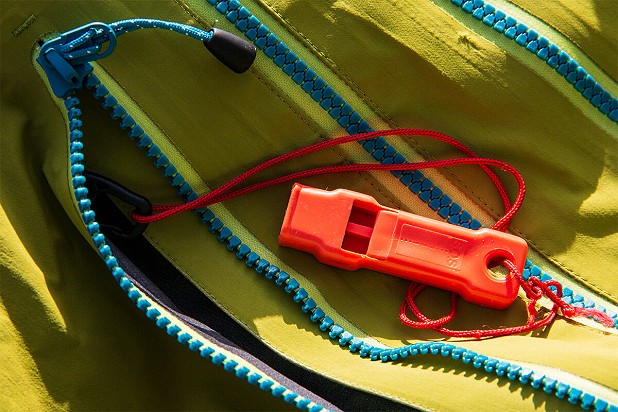Whistle
Though it weighs just a few grams, costs peanuts, and fits unnoticed in your pocket, a humble whistle could be one of the most important things you carry on a hillwalking, winter climbing or mountain crag day, helping rescuers get a fix on your position in the event of an emergency.
Unlike a phone, whistles don't need a signal, and never run out of batteries - and with no moving parts, they're hard to damage. While rucksack chest buckles often come with an inbuilt whistle these don't tend to seem that loud and are probably best considered a backup. Get a simple one made of tough plastic - 'safety orange' is de rigueur, and the standard advice is pea-less (nothing to freeze up, and less to break). It needs to be somewhere you won't forget, so attach it to the inside of a pocket or pack via a cord loop, or keep it with your compass.

"I have always been a great exponent of the whistle" says Mountain Rescue veteran David 'Heavy' Whalley in a recent blog.
"Many will have read of the recent callout in Skye, Feb 2023. A missing person was located after three days in a remote area near Coruisk. He had survived some terrible weather and had bad injuries. It was a huge search with many assets employed: SARDA dogs and Skye, Kintail and RAF Lossiemouth MRT, plus Police. He was eventually located by the Skye team who heard his whistle. A great result."
"On several occasions in my 40 years in Mountain Rescue we located a casualty thanks to a whistle. I also located some climbers over the years. We heard the whistles on the crag - a real help in finding an injured party. I and the team always carried a whistle on our harness as well. Top tip!"
But keep blowing, Heavy advises:
"Sometimes we heard them, and replied with whistles of our own. But then they stopped. It then took a few hours to locate the casualty - not easy in Skye in mist and poor weather. When we heard the whistle again it was an incredible relief to us all. Skye can be a terrifying place in poor weather on steep loose ground. When looking for someone you need every piece of help. That whistle sound will forever be with me."
Though any combination of repeated blasts would probably do the job, it helps to know the Alpine Distress Signal:
- Calling for help - Six blasts from a whistle (or flashes with a torch, mirror etc), repeated every other minute.
- Responding to a call - Three blasts, repeated every second minute.
"In these days of mobile phones and rescue beacons this is still a simpler piece of kit that I'd consider invaluable" says Heavy.
"The whistle can be a wonderful asset if you're in trouble in the hills."
For further reading on mountain rescue, see:

